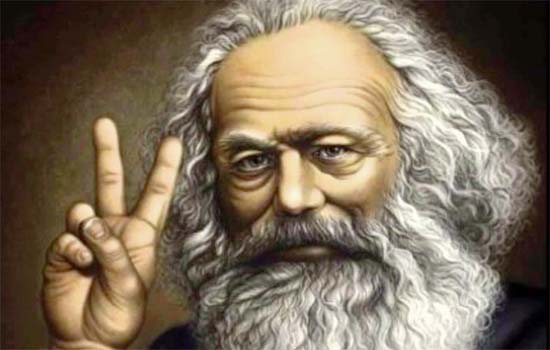
Karl Marx (5th May, 1818 – 14th March, 1883) was a German philosopher, political thinker, a journalist and an author of a high order. The world in 19th and 20th century cannot be understood without Marx and his socio-political thoughts. His classic Das Capital explained working of a capitalist economy and several of the inner contradictions that existed in it. Marx analyzed the working of the British economy of his time and laid down the basic principles which explained the accumulation of wealth largely at the cost of labour. He looked at the world from the perspective of class and explained the ways in which a capitalist economy thrives on the exploitation of labour through creation of surplus value. He, with his friend Frederick Engels gave to the world an alternative which would be more humane and create a more equitable world. His theory of class consciousness and class conflict led to several revolutions in the world including the Great October revolution in the leadership of V.I.Lenin. However, after the disintegration of USSR it came under severe criticism.
In 1845-46, Marx, a political exile in Brussels, wrote in The German Ideology these words which later formed a digest of what Friedrich Engels called after Marx’s death “Historical Materialism”:
“At a certain stage in the evolution of the productive forces, we see the emergence of productive forces and means of trade which, under existing conditions, only cause disasters. They are no longer productive forces, but forces of destruction (machinery and money).”
In 1859, Marx took up this idea almost word for word in his famous “Foreword” to his Critique of Political Economy. It reads:
“At a certain stage of their development, the material productive forces of society collide with the existing relations of production, or with the relations of property within which they had hitherto evolved, and which are but their legal expression. From forms of development of the productive forces these relations turn into their fetters. Then begins an era of social revolution.”
Looking at these quotes in the 21st century when the world is facing a huge pandemic one realizes how relevant these thoughts are today. If one looks at the map of the world today and plots the places worst hit by the pandemic of COVID 19, one realizes that the capitalist economies right from far east to western Europe and to the United States of America have been worst hit. No amount of GDP growth has helped them. In fact their association with each other is creaking under the burden of suspicion and loss of faith. Within the nation states, the blame game is going on between the ruling parties and the opposition. Jade Lindgaard and Amélie Poinssot in their article entitled “The coronavirus, a boomerang that comes back to us in the face” (Mediapart, March 22) explain how the blind race to exploit all natural resources for maximizing profits leads to a situation that helps a disease localized spread into a global pandemic: “In a very condensed way, we could summarize them by saying that the deforestation and the significant reduction in the biodiversity that industrial crops cause in plantations (rubber, oil palms, coffee or cacao) endanger ecosystems and favor the spread of the virus to human communities.Just as the quest for agricultural land contributes to deforestation, urbanization and incessant urban sprawl also participate in this same deforestation process, disrupting the living environments of several animal species. Finally, the globalization of exchanges, made up of massive flows and mobilities, channeled by transnational networks and polarized by world metropolises, rapidly transforms any regional epidemic into a global pandemic as we can see today in real time.”
In India millions of migrant workers have been the worst hit class in the society due to announcement of a sudden lockdown. In Gujarat alone 2million workers have registered to go back to their native states. Workers have walked on foot hundreds of miles to go back to their villages. A worker traveled on a bicycle with his 90 years old mother right from Banguluru to Rajasthan. Hundreds of them died on the way. The industries and the unorganized sector which employed them had no arrangements for the stay, food and medicines of the workers. They felt abandoned and destitute.As the situation today is, the working class needs to unite and fight for the social security measures and schemes including health care and pension which have been left for the private sectors to earn profits even this crisis. There are shameless advertisements of insurance companies cashing on the fear and uncertainty caused by this pandemic. On 5th of May when the world remembers Karl Marx, it would be good if we look back at the work he did for humanity and draw lessons from it.